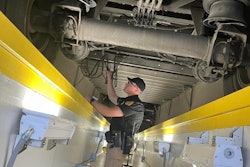Trucking news and briefs for Thursday, Sept. 26, 2024:
Oregon receives waiver allowing CDLs for certain non-citizens
The Federal Motor Carrier Safety Administration has granted a waiver to allow the Oregon Department of Transportation to issue CDLs to certain non-citizens.
The Oregon DOT in June requested a waiver from the proof of citizenship CDL requirements to be allowed to issue standard commercial learner permits (CLPs) and CDLs, rather than issuing non-domiciled CLPs and CDLs, to citizens of Freely Associated States (FAS) who now reside in Oregon and wish to obtain a CDL. The FAS are the Federated States of Micronesia, the Republic of the Marshall Islands, and the Republic of Palau.
Under agreements between the U.S. and the FAS, citizens of the FAS may enter the United States as nonimmigrants, and, without obtaining a visa, they may remain in and work in the country indefinitely.
The exemption allows Oregon to accept a valid, unexpired passport issued by a FAS and an Arrival/Departure Record, meaning an I-94 or I-94A form, to prove that the individual has entered the United States lawfully, and issue standard CLPs and CDLs to these individuals.
In making this determination, FMCSA noted that the Department of Homeland Security allows states to issue full-term REAL ID licenses and ID cards to citizens of FAS. DHS provides requirements for citizens of FAS to present proof of lawful permanent residency such that these individuals may receive REAL ID credentials, and the exemption pertains only to proof of lawful permanent residency.
FMCSA decided to grant the exemption to Oregon for a five-year period. Hawaii also recently requested the same waiver.
[Related: Hawaii requests limited waiver from proof of citizenship rules]
PrePass adds GPS verification to toll management service
Weigh station bypass and toll management service PrePass this week introduced its new GPS Toll Verification service, which the company said “will save fleets considerable time and money by matching GPS locations to toll charges, thereby proactively identifying potential billing inaccuracies.”
By leveraging the PrePass app, GPS technology that many fleets already rely on, and a proprietary machine-learning engine, GPS Toll Verification automatically detects and highlights inaccurate toll charges.
“Our customers often face challenges in understanding and validating charges from the various tolling agencies their fleets use,” said Chris Murray, President of PrePass. “The ability to automatically verify toll charges using GPS technology and PrePass’ proprietary matching engine, not only provides them with confidence in their overall tolling expenses but also translates to significant cost savings, offering one less thing to worry about in their day.”
Available on Android, iOS, and integrated telematics platforms, the service ensures that fleets only pay for the tolls they incur, leading to substantial cost savings.
The GPS Toll Verification process will deliver insights that empower fleets to manage tolling expenses more effectively or to initiate tolling disputes, which PrePass can process on behalf of its customers. The INFORM Tolling Analytics Dashboard provides PrePass customers enhanced visibility into their toll charges and the status of disputes.
With GPS location data generated from the PrePass app or a telematics service provider, fleet managers can confidently validate their toll charges, ensuring they are not overpaying and reducing the administrative costs and complexity of managing them.
Cummins partners with Bosch, KPIT for open-source telematics project
Cummins Inc. has partnered with Bosch Global Software and KPIT to launch a new open-source vehicle telematics project as part of the Eclipse Software Defined Vehicle project.
The Eclipse CANought project is part of a broader Open Telematics initiative to reduce the costs required to develop telematics applications for commercial vehicles.
“Cummins is partnering with two industry experts on this project, Bosch Global Software and KPIT, two companies that have extensive expertise in vehicle telematics and CAN communications,” said Brad Sutton, Executive Director, Powertrain Engineering, Cummins Inc. “Our combined expertise and experience enable us to innovate and create new solutions faster than we could individually, creating real value for our customers and their businesses.”
Eclipse CANought creates industry-specific capabilities focused on standardizing and securing access to the CAN (Controller Area Network) bus to more easily enable features, such as over-the-air software updates. A CAN bus is a serial communications network that interconnects vehicle ECUs (Electronic Control Units), acting as the central nervous system for the vehicle.
These capabilities significantly reduce the time and cost required to develop connectivity applications that access and update vehicle ECUs, Cummins said, simplifying software integration work for OEMs (original equipment manufacturers) and suppliers.
Eclipse CANought provides standard and secure access to vehicle ECUs for telematics applications. It complements an existing project, Eclipse Kanto, which provides a hardware-agnostic solution for running containerized applications across any variety of telematics hardware.
Eclipse Kanto and Eclipse CANought will be incorporated into telematics offerings being brought to market starting in 2025.
ATRI seeks driver feedback on demographic info
The American Transportation Research Institute (ATRI) is conducting research to understand the make-up of the U.S. truck driver population and how it is changing over time.
ATRI will assess over 20 years of survey data from truck drivers, and this latest truck driver survey will provide the newest information on the composition of the truck driver population today -- allowing the research to compare changing trends.
The brief survey will seek insights on professional and personal aspects of truck drivers today, enabling ATRI to understand the shifts in the truck driver population over the last few decades. All collected data will be kept completely confidential.
The survey is being conducted in concert with ATRI research that is assessing how underrepresented groups might be recruited into the trucking industry, including women, foster care participants and formerly incarcerated individuals.
Truck drivers are encouraged to participate in the survey here.












